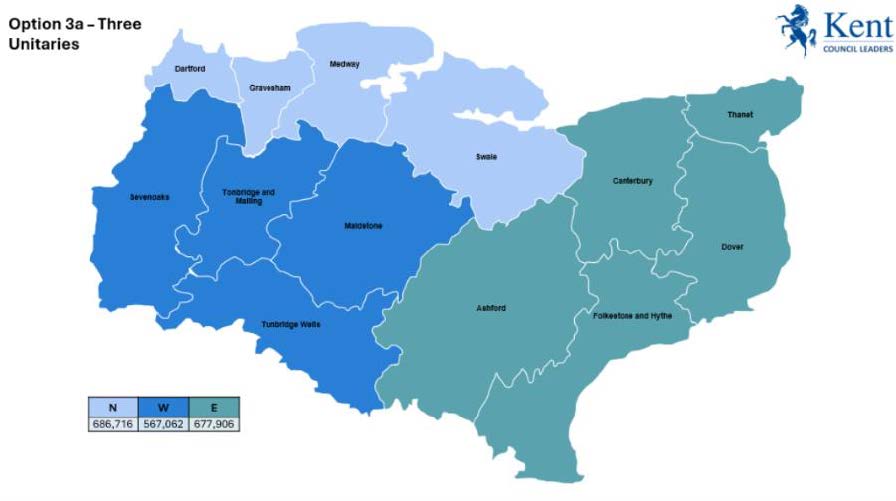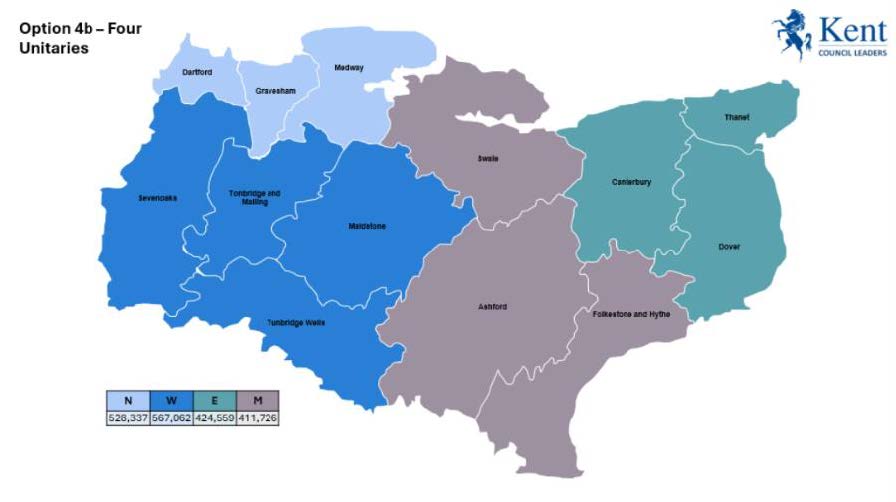Local Government Reorganisation
In December 2024 the Government published the English Devolution White Paper inviting councils to apply for priority status.
Alongside plans for devolution, in the biggest shake-up of local government in 50 years, the Government plans to replace existing county councils and borough/district councils with unitary councils – this is known as Local Government Reorganisation.
In most areas, this means creating councils that serve at least 500,000 people. However, there may be exceptions to make sure the new system works well for each area. Each decision will be made on a case-by-case basis.
Although Kent was not selected for the Devolution Priority Programme, the process of Local Government Reorganisation continues. Council leaders across Kent were invited to submit a proposal for Local Government Reorganisation in Kent and setting out the criteria against which any such proposal will be assessed.
The proposal would see Kent County Council, the borough and district councils in Kent, and Medway Council, being replaced with unitary councils.
Devolution means giving local government more power and funding from the national government. Local Government Reorganisation is about deciding how that power and funding is shared between councils.
Unitary councils deliver all council services in the area they serve from education, social services and roads to emptying bins and providing housing services.
Unitary councils provide the same services as both county and district councils do now.
The Government envisages that most new unitary councils should be the right size to achieve efficiencies, be financially resilient and improve capacity.
Currently in the Tunbridge Wells borough local government services are provided by both Kent County Council and Tunbridge Wells Borough Council.
Kent County Council is responsible for, among other things, highways, social services and education. Tunbridge Wells Borough Council is responsible for, among other things, planning services, licensing, recycling and waste collections. A unitary council would be responsible for all local government services in its area.
Working with the other councils in Kent we submitted an interim proposal to the Government on 21 March 2025.
Feedback on the interim proposal was received on 16 May 2025. The feedback focused on key things that need to be incorporated into the final submission, it did not approve or reject any of the options in the interim proposal.
Read the feedback received in May 2025:
On 3 September 2025 Kent’s councils asked experienced advisors KPMG, whose work is being paid for by the Government, to look in more detail at two options for new unitary councils and the areas they should cover.
On 5 November 2025 Tunbridge Wells Borough Council along with other councils across Kent and Medway published a series of draft business cases to help inform the next steps.
The cases, compiled with the help of KPMG, explored different options for the number of unitary councils in Kent and the areas they should cover in the future.
The business cases were considered by Full Council and Cabinet on 17 November 2025 and Option 3a was selected as Tunbridge Wells Borough Council’s preferred option. This would see Sevenoaks, Tonbridge and Malling, Maidstone and Tunbridge Wells become one of three new unitary councils in Kent.
A final proposal was submitted to the Government on 28 November 2025.
In early 2026 the Government is expected to carry out public consultation with all Kent residents on the preferred options.
A decision by the Government on the final structure of unitary councils is expected in summer 2026.
Based on the Government’s timetable, the new arrangements could be in place as early as April 2028.
Nothing has been agreed yet.
Leaders of the 14 Kent councils submitted an interim proposal in March 2025 suggesting three or four unitary councils.
On Wednesday 19 March 2025 an Extraordinary Full Council meeting considered the interim proposal. You can watch a recording of the meeting.
On 3 September 2025 Kent’s councils asked experienced advisors KPMG, whose work is being paid for by the government, to look in more detail at two options for new unitary councils and the areas they should cover.
On 5 November 2025 Tunbridge Wells Borough Council along with other councils across Kent and Medway published a series of draft business cases to help inform the next steps.
The business cases were considered by Full Council and Cabinet on 17 November 2025 and Option 3a was selected as Tunbridge Wells Borough Council’s preferred option. This would see Sevenoaks, Tonbridge and Malling, Maidstone and Tunbridge Wells become one of three new unitary councils in Kent.
A final proposal was submitted to the Government on 28 November 2025.
In September 2025 Kent’s councils asked experienced advisors KPMG, whose work is being paid for by the Government, to look in more detail at two options for new unitary councils and the areas they should cover.
Option 3a – Three unitary councils

Three unitary councils consisting of Dartford, Gravesham, Medway and Swale in the north; Sevenoaks, Tonbridge and Malling, Maidstone and Tunbridge Wells in the west and Ashford, Canterbury, Thanet, Dover and Folkestone and Hythe in the east.
Option 4b – Four unitary councils

Four unitary councils consisting of Dartford, Gravesham and Medway in the north; Sevenoaks, Tonbridge and Malling, Maidstone and Tunbridge Wells in the west; Swale, Ashford and Folkestone and Hythe in the middle of Kent and Canterbury, Thanet and Dover in the east.
Councils across Kent kept the option to pay for and submit business plans for alternative options themselves using the KPMG data.
Medway Council is proposing a four-unitary model with changes to existing council boundaries. This is known as Option 4d.
Gravesham Borough Council and Dartford Borough Council have developed proposals for a five-unitary model also including a number of boundary changes. This is known as Option 5a.
KCC announced its intention to explore the case for a single unitary council covering Kent and Medway supplemented with three area committees covering the north, east and west of the county. This is known as Option 1a.
Each council has followed its own decision-making process to decide which option it supports.
The business cases were considered by Full Council and Cabinet on 17 November 2025 and Option 3a was selected as Tunbridge Wells Borough Council’s preferred option.
You can read the business cases for all the different options here: Councils Reveal Draft Business Cases for New Councils - Kent Council Leaders
The final decision rests with ministers.
Town and parish councils are not affected by local government reorganisation.
We will keep residents, businesses and other partners informed about the progress of Local Government Reorganisation in Kent and will give you the opportunity to get involved.
In 2026 the Government is expected to carry out public consultation with all Kent residents on the preferred options.
In the meantime, if you have any concerns, questions or views that you would like us to be aware of please email reorganisation@tunbridgewells.gov.uk
You can also read about Local Government Reorganisation here https://kentcouncilleaders.org.uk/
Some documents on this page may not be in an accessible format. If you require any documents in an accessible format, please complete our online form to request them.